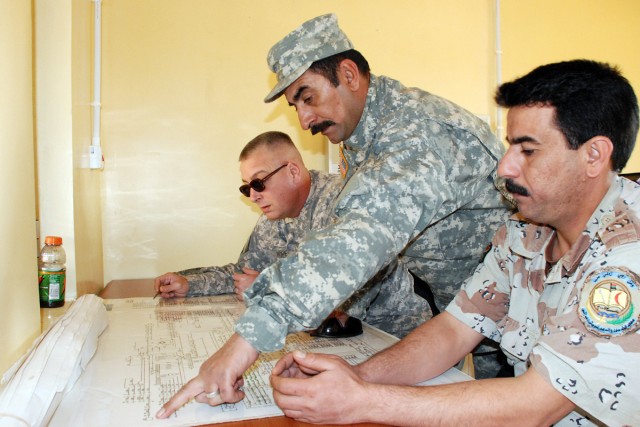
CAMP TAJI, Iraq - Staff Sgt. Gary Hope, senior power generation equipment repairer for 277th Aviation Support Battalion, 10th Combat Aviation Brigade, is preparing to return to his unit on Contingency Operating Base Speicher this week after spending the last two and a half months attached to the Iraqi Army Support and Service Institute (IASSI).
The Institute, established March 15, 2005 by the Iraqi Ministry of Defense, was created to train IA leaders, but has since expanded to provide initial-entry training in logistics and administration, food services, medical and maintenance occupational specialties. U.S. Army personnel assigned to IASSI do not teach the students directly, but rather act as advisors to Iraqi instructors.
"Basically, I advise the two power generation equipment repairer instructors on how to improve their classes, and assist them in getting training aides or whatever they need to make their classes as modern as possible," Hope explained.
"We don't teach - we can't. We have to step back, and let them take responsibility for their own training." One way the advisors help instructors is by developing programs of instruction built around the material that needs to be taught and the amount of time the instructor has to teach, but based on training models developed by the U.S. Army. "In the new Iraqi army, their whole education system has changed," said Lt. Col. Nora Garono, senior U.S. advisor to IASSI, pointing out that under the old regime where leaders were appointed to their positions, career progression had little to do with what you knew and more to do with who you knew.
"For a strong and democratic Iraq, we're trying to influence them into a training model similar to our own. Institutional training is part of that sustain model."
But there are obstacles to overcome, including lack of resources, training aids and time.
"Iraqi soldiers have a lot less time to learn than U.S. Soldiers in similar military occupational specialties," Hope said.
"Power generation equipment repairers in the U.S. Army go through six months of training; the Iraqi students get 21 days of instruction."
Although he wishes he had more time at IASSI to help develop a power generation course that will make the most of three weeks of instruction, Hope said with all the technological advancements being made, there will never be enough time to teach the mechanics everything they need to know. For this reason, the POI he is leaving behind focuses on power generation theory.
"The biggest problem these students face is dealing with modern power generation equipment," he said.
"From what they have told me, most Iraqi homes are powered by smaller, older generators; but the Iraqi army compounds deal with commercial generators. They do the same things, but all the components and parts are different, so we're trying to teach basics and theory of power generation that they can apply to any model." For Hope's POI to become a standard training module it must first be translated into Arabic, approved by IASSI's U.S. chain of command, and then forwarded to the Iraqi Army for final approval. "We can't force training on them," he said.
"They have to accept it, but training is most important when standing up a new army like this. We're trying to give them guidance to organize and structure an army able to sustain itself; but it's hard."
Hope recalled one of his first experiences at the institute, when he was helping an instructor fix a broken generator. After identifying the problem, Hope told the instructor which part they needed. The instructor motioned for Hope to follow him, and said they were going to go pick up the part; but instead of going to a supply warehouse or store, he led Hope to a yard filled with "dead" generators and began scavenging for the needed piece.
That first encounter gave Hope a clear idea of the kind of difficulties the new Iraqi army is facing, but also how determined and resourceful its people are.
"I respect what they go through," he said. "They're going to do the best they can with what they've got, but that's not much. I took things for granted in the U.S. Army, where if you ask for something, you get it. For them, it's very difficult; but they do what they've got to do to keep their generators running." But Hope believes the work he and other U.S. advisors are doing at IASSI is making a difference.
"We're making history here," agreed Chief Warrant Officer 5 William Davenport, senior maintenance advisor. "I reflect back to the 1700s, when our American Army was forming. It's going to take the Iraqis a little while to get there, but I don't think it's going to take as long as some people think. They're very resourceful, and they have the benefit our 200-plus years of experience."
Hope said he was happy to lend his knowledge and expertise to help another developing army grow.
"I definitely feel like I've helped out here," he said. "My goal was to teach them to be self-sufficient, and to know that when I walk away, they'll be able to manage on their own.
"Of course I wish I had more time," Hope added, "but I'm needed back at my unit. I wish I could do both jobs, but I'm sure these guys will be just fine. They're running the show now."

Social Sharing